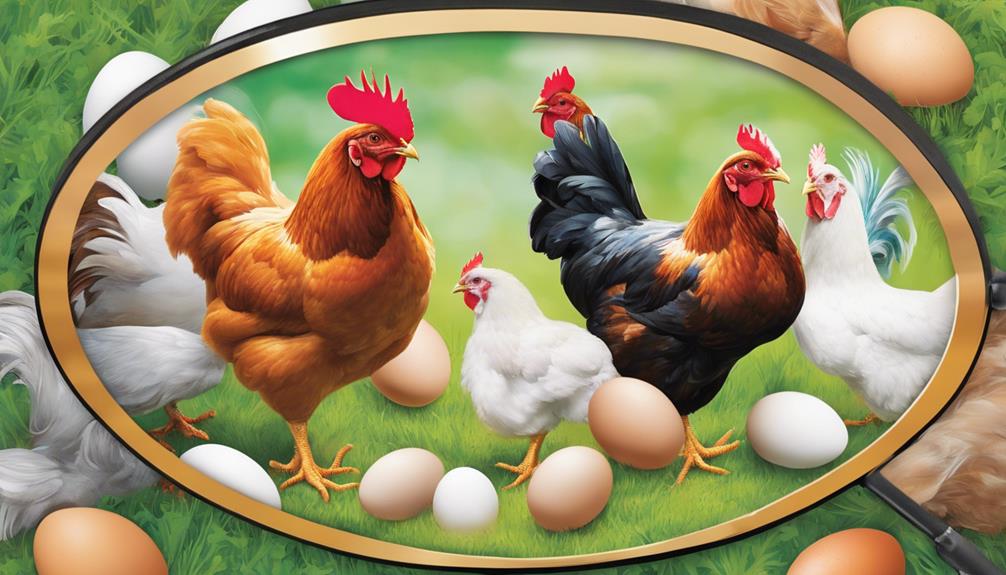Just as a well-oiled machine runs smoothly, your backyard chickens need optimum care to produce eggs consistently. You've likely pondered the impact of nutrition, age, and living conditions on your hens' health and egg production.
Addressing these aspects involves more than just providing feed and water; it's about creating a balanced diet, ensuring a stress-free environment, and managing light exposure.
But how can you implement these strategies effectively without breaking the bank or overwhelming your daily routine? Let's explore practical steps to enhance your chickens' well-being and, consequently, their egg-laying capabilities, leaving you curious about the simple yet impactful changes you can make.
Key Takeaways
- Ensure a balanced diet with at least 16% protein and adequate calcium for strong eggshells.
- Maintain a clean, well-ventilated coop to prevent diseases and stress.
- Provide 16 hours of light daily to optimize egg production cycles.
- Implement parasite prevention measures and regular health checks to keep chickens healthy.
Optimal Nutrition Strategies
To boost your backyard chickens' health and egg production, it's crucial to focus on their diet, ensuring it includes at least 16% protein, adequate calcium, probiotics, essential vitamins, minerals, and certain natural supplements. Protein is the building block for egg production; without enough, your hens won't lay as efficiently.
You'll want to include calcium-rich sources like oyster shells or crushed eggshells in their diet to help them lay strong-shelled eggs. This is vital because weak shells can lead to egg breakage and loss of potential chicks.
Introducing probiotics into their diet can significantly improve your chickens' digestive health. This leads to better nutrient absorption, which in turn, increases egg laying. Consider adding natural supplements such as dried peppermint leaves or fresh lemon to their diet. These can bolster their overall health, contributing to higher egg production.
Enhancing Coop Conditions
To kick off our discussion on enhancing coop conditions, let's focus on ensuring optimal coop ventilation and establishing a regular cleaning schedule.
By doing so, you'll not only maintain good air quality but also prevent the spread of diseases and parasites among your chickens.
These steps are crucial for creating a healthy and safe environment for your backyard flock.
Optimal Coop Ventilation
Ensuring proper ventilation in your chicken coop regulates temperature and humidity, crucial for your flock's health and productivity. Proper coop ventilation isn't just about letting fresh air in; it's about creating a sustainable environment where your chickens can thrive, free from the risks that can hinder their well-being and egg production. Consider these essential points:
- Adequate airflow helps maintain an optimal temperature and reduces humidity levels.
- It prevents harmful ammonia buildup from droppings, protecting your chickens from respiratory issues.
- Good ventilation stops moisture accumulation, lowering the risk of mold and bacterial growth.
- It also controls odors and minimizes airborne pathogens, ensuring a healthier living space.
Regular Cleaning Schedule
Adopting a regular cleaning schedule for your chicken coop reduces bacterial infection risks and boosts overall health and egg production. Keeping your coop clean ensures your laying hens are in a hygienic environment, crucial from their prime age for egg-laying through their entire productive period.
By removing feces, old bedding, and debris weekly, you're not just maintaining cleanliness but also preventing pests and parasites that can lower egg production. This practice directly influences the health and comfort of your backyard chickens, leading to better egg quality.
Moreover, a clean coop bathed in adequate light supports optimal egg production trends, ensuring your efforts in raising backyard chickens yield fruitful results. Prioritize hygiene to maintain the health and egg quality of your laying hens.
Light Management Techniques

Implementing effective light management techniques can significantly boost your backyard chickens' egg production. To make sure your hens lay consistently, it's crucial to manage their exposure to light carefully. This can lead to an optimal schedule that promotes regular egg production.
Here are some tips to achieve this:
- Provide 16 hours of light daily: This is the magic number to maximize egg production. Your chickens need enough light to stimulate their laying process effectively.
- Use the right bulbs: Supplement their natural daylight with either 25-watt incandescent bulbs or more energy-efficient 3-9 watt LED bulbs. This ensures they're getting a consistent light source, even on the shorter days of the year.
- Automate the light-dark cycle: Equip your coop with automatic timers to maintain a regular light-dark cycle. Consistency is key; sudden changes can disrupt their laying patterns.
- Understand the importance of supplemental light: As days get shorter, your hens might stop laying due to less natural sunlight. Supplemental lighting compensates for this, ensuring sustained production.
Parasite Prevention Measures
Moving on, let's tackle how you can keep those pesky parasites at bay in your backyard chicken coop.
You'll learn about identifying common parasites and explore natural control strategies that are both effective and safe for your feathered friends.
It's about ensuring they're not just surviving, but thriving in a clean and healthy environment.
Identifying Common Parasites
To protect your backyard chickens from the adverse effects of parasites, it's crucial to identify common culprits such as mites, lice, and worms. Knowing what to look for can significantly enhance your parasite control efforts.
Here are four key points to keep in mind:
- Regular Inspections: Regularly check your chickens for signs of parasites, including feather loss, irritation, or decreased egg laying.
- Clean Coop Practices: Keep the coop clean to prevent parasite infestations.
- Dust Baths: Provide dust baths enriched with diatomaceous earth to naturally reduce parasite loads.
- Professional Consultation: Consult a veterinarian for tailored strategies in managing parasites effectively.
Natural Control Strategies
Adopting natural control strategies can significantly reduce your backyard chickens' risk of parasite infestation. Implementing rotational grazing lessens the parasite load in their environment, making it harder for these pests to thrive.
Sprinkling diatomaceous earth around the coop acts as a natural barrier against external parasites like mites and lice, safeguarding your chickens without the use of harsh chemicals.
Offering dust baths filled with sand, wood ash, or diatomaceous earth allows your chickens to naturally control parasites, promoting their health and well-being.
Introducing beneficial insects such as predatory mites into the coop environment can help manage harmful parasite populations effectively.
Additionally, regular coop cleaning is essential in preventing the buildup of parasites, ensuring your chickens live in a healthy, parasite-free environment.
Selective Breeding Insights

Understanding selective breeding gives you insights into how breeders enhance traits like egg size and health in backyard chickens. By focusing on selective breeding, you're diving into a world where genetic selection plays a key role in developing the ideal backyard chickens for egg production. Breeders meticulously choose chickens with specific traits to ensure the offspring exhibit improved characteristics crucial for optimal egg production.
Here's what you need to know about selective breeding:
- Traits Selection: Breeders prioritize traits such as egg size, shell strength, laying frequency, and overall health. These traits are essential for producing efficient layers.
- Genetic Enhancement: Through selective breeding, genetic traits that lead to increased egg production and quality are enhanced, making your backyard chickens more productive.
- Breeding Programs: Selective breeding programs are designed to develop strains of chickens that not only lay efficiently but are also adaptable to different environments and resilient to diseases.
- Productivity and Health: Genetic selection in these breeding programs is crucial for improving the overall productivity and health of backyard chickens, aiming for optimal egg production.
Age-Related Care Adjustments
As backyard chickens age, adjusting their care becomes crucial to maintain egg production and overall health. It's essential to acknowledge that older hens might stop laying as frequently, but you can still support their well-being and productivity with a few adjustments.
| Age-Related Adjustment | Benefit | Emotion Evoked |
|---|---|---|
| Adjust feeding schedules | Matches decreased egg production | Understanding |
| Monitor calcium intake | Supports strong eggshells | Reassurance |
| Additional nesting boxes | Reduces stress among hens | Comfort |
| Regular health check-ups | Addresses age-related issues | Security |
Firstly, adjust feeding schedules to accommodate the decreased egg production in older hens. They won't need as much feed, but ensuring they get enough calcium is vital. Consider oyster shells as a supplement to maintain strong eggshells. Providing additional nesting boxes can reduce competition and stress, making the coop a more peaceful place for your aging hens. Regular health check-ups are crucial for catching any issues early, and incorporating probiotics into their diet can aid digestion, keeping your older hens healthier for longer. These steps ensure your backyard chickens continue to thrive, even as they age.
Conclusion
In conclusion, you've got the power to significantly boost your backyard chickens' egg production by honing in on their health. By providing well-balanced nutrition, optimizing coop conditions, managing light exposure, preventing parasites, considering selective breeding, and making age-related care adjustments, you're setting your flock up for success.
Remember, healthy chickens mean plentiful eggs. So, take these steps to heart and watch as your egg basket fills up. Here's to happy, healthy chickens and a bountiful egg harvest!